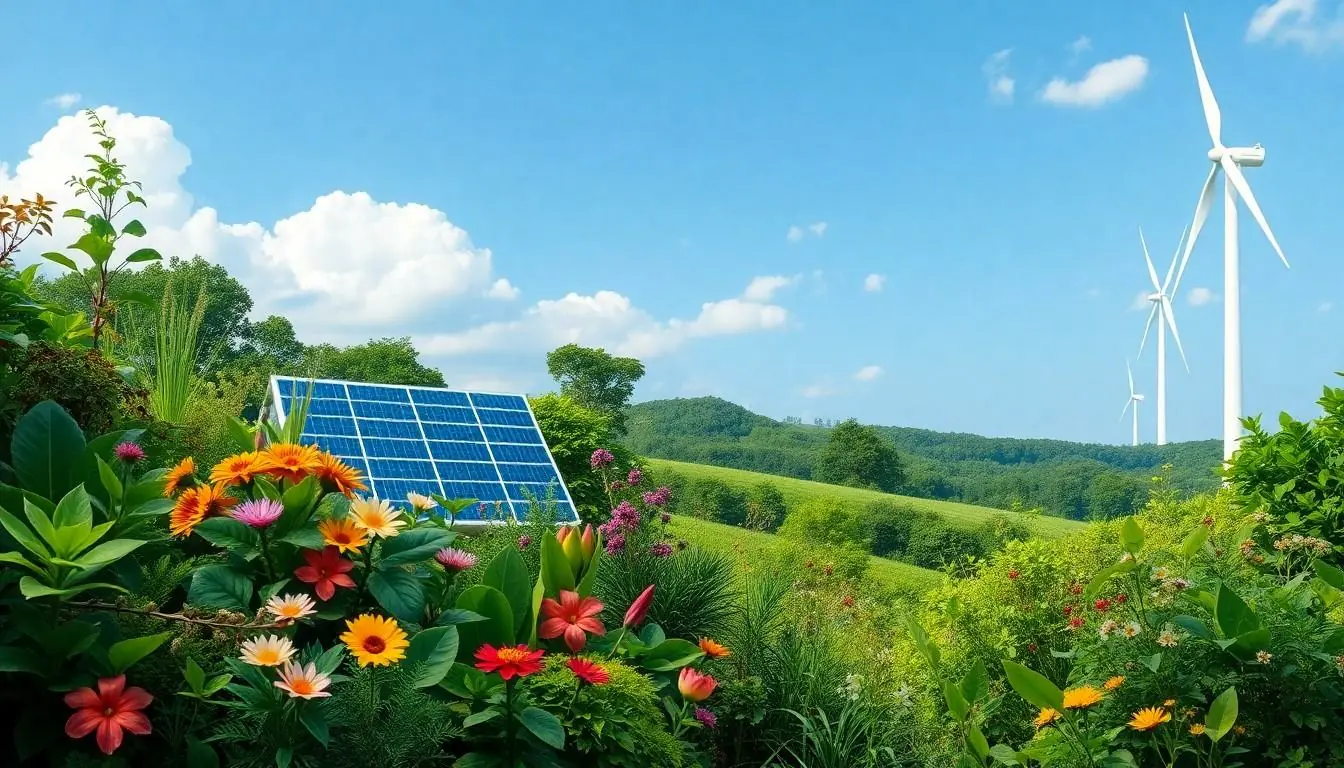In a world where eco-friendly is the new black, finding fresh ways to express sustainability can feel like searching for a needle in a haystack. But fear not! There’s a treasure trove of synonyms just waiting to be unearthed. Whether you’re crafting the perfect marketing pitch or simply trying to impress your friends at the next dinner party, knowing other words for sustainable can turn you into a green guru.
Table of Contents
ToggleOverview of Sustainability
Sustainability encompasses practices that maintain ecological balance while promoting social and economic well-being. It aims to meet present needs without compromising future generations’ ability to satisfy their own. This concept applies to various sectors, including agriculture, energy, and business.
Numerous terms express aspects of sustainability. For instance, “eco-friendly” highlights products or practices that minimize environmental harm. “Renewable” refers to resources that can regenerate, such as solar or wind energy. The term “green” generally indicates environmentally responsible actions or materials.
Other words convey similar meanings. “Sustainable development” stresses meeting current demands while safeguarding future resources. “Resilient” describes systems that can withstand environmental changes, promoting long-term viability. “Biodegradable” applies to materials that naturally decompose, reducing waste.
Organizations and individuals can adopt these synonyms to enhance communication. By using varied language, they express commitment to eco-conscious practices. Alternative terms facilitate more engaging conversations about environmental issues.
Additionally, exploring synonyms encourages creativity in sustainability discussions. Such diversity in vocabulary allows for more precise descriptions of specific practices. Using the right words can inspire action and foster a deeper understanding of sustainability’s importance.
Synonyms for Sustainable

Finding alternatives for the word “sustainable” enhances clarity in discussions around eco-conscious practices. The following terms reflect various aspects of sustainability.
Ecological
Ecological reflects the interconnectedness of living organisms and their environments. This term emphasizes practices that maintain ecological balance and promote biodiversity. Using ecological in marketing and conversations conveys a commitment to preserving natural habitats. Organizations focused on ecological principles adopt methods that reduce waste, conserve resources, and protect ecosystems. Sustainable initiatives often stem from ecological considerations, reinforcing holistic approaches to environmental stewardship.
Environmental
Environmental encompasses practices that safeguard the Earth’s natural resources. This term underscores efforts aimed at reducing pollution and conserving ecosystems. Businesses that commit to environmental responsibility often create programs that minimize their carbon footprint, promoting waste reduction and resource efficiency. By adopting environmental practices, individuals foster a healthier planet for future generations. Conversations featuring environmental as a synonym for sustainable encourage collective efforts toward climate resilience and ecological integrity.
Renewable
Renewable signifies resources that can be replenished naturally, such as solar and wind energy. This term highlights the importance of using energy sources that minimize long-term environmental impact. Companies incorporating renewable strategies often rely on technologies that limit fossil fuel dependency. Emphasizing renewable in discussions showcases a focus on clean energy solutions and innovative practices. Organizations embracing renewable methods contribute significantly to sustainable development goals and a resilient future.
Words Relating to Sustainable Practices
Exploring various terms associated with sustainability enhances understanding and communication about eco-friendly practices. Here are some relevant alternatives to consider.
Green
“Green” signifies eco-friendly approaches that prioritize environmental health. This term encompasses practices such as using renewable energy sources, reducing waste, and conserving water. Businesses often use the word to describe products that minimize negative impacts on ecosystems. Choosing “green” suggests a commitment to lower carbon footprints and increased energy efficiency. Using green resources contributes to healthier communities and ecosystems.
Responsible
“Responsible” refers to actions that consider societal and environmental implications. It emphasizes accountability in resource usage and decision-making processes. Individuals and organizations adopting responsible practices ensure their choices benefit both people and the planet. Examples include ethical sourcing of materials and promoting fair labor practices. Emphasizing responsible behavior inspires others to consider the broader effects of their actions.
Enduring
“Enduring” conveys the idea of long-lasting principles and practices in sustainability. This term highlights the importance of resilience in ecological systems and societal structures. Implementing enduring strategies ensures that resources remain available for future generations. Sustainable agriculture and conservation efforts are examples of enduring practices that maintain environmental integrity. Focusing on enduring solutions promotes balance within ecosystems while securing economic and social well-being.
Alternative Phrases for Sustainability
Finding alternative phrases for sustainability enhances the conversation around eco-conscious practices. Incorporating varied terminology helps clarify one’s commitment to environmental stewardship.
Long-Term Viability
Long-term viability emphasizes practices that support lasting ecological health. This term underlines the importance of consistency in using resources responsibly. Organizations prioritizing long-term viability often showcase strategies that benefit both society and the environment. They focus on methods that allow ecosystems to thrive over time. By highlighting long-term viability, individuals convey their dedication to creating sustainable systems that endure future challenges.
Resource Preservation
Resource preservation captures the essence of minimizing waste and maximizing efficiency. This phrase is crucial for discussions surrounding conservation efforts and thoughtful resource management. Recognizing the significance of resource preservation encourages responsible consumption. Practices related to this term include recycling, reducing waste, and using renewable materials. By adopting the concept of resource preservation, one clearly demonstrates a commitment to protecting natural resources for future generations.
Exploring alternative words for sustainable opens up new avenues for communication. It allows individuals and organizations to articulate their commitment to eco-friendly practices more effectively. By using terms like ecological, renewable, and resource preservation, conversations about sustainability become more engaging and impactful.
These synonyms not only enhance understanding but also inspire action towards environmental responsibility. Embracing diverse language surrounding sustainability can foster a deeper connection to the cause, encouraging more people to participate in the movement. As awareness grows, so does the potential for meaningful change in how society approaches environmental issues.






